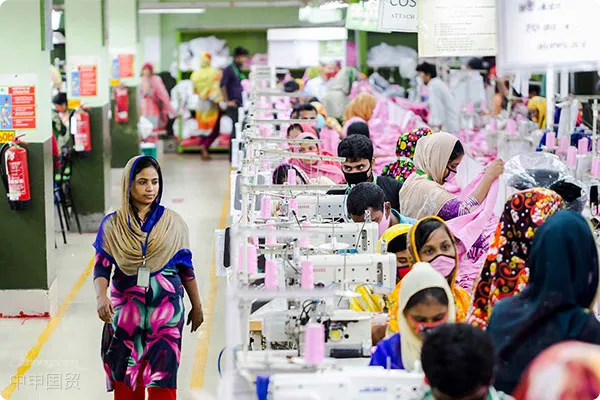- Shanghai Zhongshen International Trade Co., Ltd. - Two decades of trade agency expertise.
- Service Hotline: 139 1787 2118
Recently, as domestic turmoil escalates in Bangladesh, many international brands are relocating their footwear and apparel orders from Bangladesh to Southeast Asian countries. This trend has raised deep concerns about Bangladeshs economy, particularly its highly dependent garment and textile industry.

On August 4, nationwide protests erupted in Bangladesh, ultimately leading to the resignation of former Prime Minister Sheikh Hasina and triggering a government transition. This political unrest has not only shaken the countrys political stability but also severely impacted Bangladeshs economic activities, particularly its garment and textile sector. According to foreign media reports, many textile factories in Bangladesh were forced to shut down earlier this month, with protests causing widespread factory closures and even arson attacks on some facilities amid the chaos.
International brands have responded swiftly to the situation in Bangladesh. Japans Asahi Shimbun reported that despite some calming of protests, many brands remain concerned about Bangladeshs instability. For instance, Fast Retailing Group (parent company of UNIQLO) has temporarily instructed its employees in Bangladesh to work from home. Suppliers for global brands like H&M and Zara suffered significant losses during the riots, with many factories forced to close for several days. Although operations have gradually resumed, the backlog of orders now requires expensiveAir Transportationshipping, which undoubtedly erodes factory profits.
Amid this uncertainty, some international brands are choosing to transfer orders to more stable Southeast Asian countries. A representative from Dhaka-based garment manufacturer Urmi Garments revealed that the factory lost 228,000 products worth $107,000 due to the protests. As the chaos continues, some major brands are shifting next seasons orders to competing suppliers in Southeast Asia, particularly Cambodia and Indonesia. This decision could pose a significant threat to Bangladeshs economic foundation, especially since its garment and textile industry relies so heavily on international orders.
Mamun Rashid, a consultant for Bangladesh garment manufacturers, stated that clients from Spain and Germany have explicitly said they are transferring 40% of their orders to other Southeast Asian countries. They are concerned about the current uncertainty in Bangladesh and unsure how long the turmoil will last. Similarly, Manzur, president of the Bangladesh Leather Goods and Footwear Exporters Association, noted that large companies plan to reduce orders from Bangladesh by about 30% next season.
Bangladesh, the worlds second-largest apparel exporter, has long attracted global attention in the garment and textile industry due to its abundant and low-cost labor. According to Chinas Ministry of Commerces Country (Region) Guide for Foreign Investment Cooperation: Bangladesh, the country has a population of approximately 170 million, with 67.61% aged 15-64. Currently, about 5 million Bangladeshis work in the garment industry, over 80% of whom are women. Globally, Bangladesh ranks second only to China in apparel exports. In 2023, garment and textile exports accounted for 83% of Bangladeshs total export trade, with many global brands heavily reliant on its production capacity.
For example, Swedish apparel brand H&M sources clothing from about 1,000 factories in Bangladesh; Spanish Inditex Groups fast-fashion brand Zara has production clusters in Bangladesh; and Japanese brand UNIQLO operates approximately 29 processing plants there. Additionally, VF Corporation, parent company of brands like The North Face and Vans, has established factories or imports garments from Bangladesh.
However, the current unrest is shaking international brands confidence in Bangladesh. Syed Nasim Manzur, CEO of Apex Footwear, a supplier for companies like Decathlon and Fast Retailing, stated that this volatility shakes the confidence of international brands entering Bangladesh. If stability cannot be restored, Bangladeshs garment and textile industry may face even greater challenges.
As global brands shift orders to Southeast Asia, Bangladeshs economy will face more severe tests. Although the countrys labor cost advantage remains significant, political instability and resulting production disruptions may force more brands to relocate production to more stable regions. This could have long-term effects on Bangladeshs economy and potentially reshape the global garment and textile supply chain.
Related Recommendations
? 2025. All Rights Reserved. 滬ICP備2023007705號-2  PSB Record: Shanghai No.31011502009912
PSB Record: Shanghai No.31011502009912









